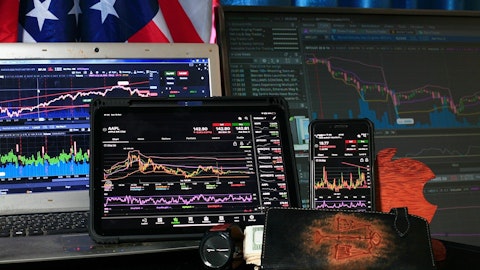3. International Business Machines Corporation (NYSE:IBM)
Dividend Yield as of June 20: 4.89%
Number of Hedge Fund Holders: 43
Levin Capital Strategies’ Stake Value: $21,215,000
International Business Machines Corporation (NYSE:IBM) is a New York-based technology company that provides a wide range of hardware and software services to consumers. In May, the company signed a strategic agreement with Amazon Web Services that will provide clients with quick and easy access to IBM software.
In Q1 2022, International Business Machines Corporation (NYSE:IBM) reported a 12% year-over-year growth in its software revenue, while its consulting revenue also saw a 17% growth from the same period last year. The company’s gross revenue came in at $14.2 billion, which surpassed market estimates by $360 million.
During Q1 2022, Levin Capital added another 34,601 IBM shares, increasing its position in the company by 27%. The hedge fund’s total stake in the company amounted to over $21.2 million, which represented 2.04% of John A. Levin’s portfolio. International Business Machines Corporation (NYSE:IBM) has paid uninterrupted dividends to shareholders since 1916 and maintains a 27-year track record of dividend growth. Currently, the company pays a quarterly payout of $1.65 per share, with a yield of 4.89%, as of the close of June 20.
At the end of Q1 2022, 43 hedge funds tracked by Insider Monkey presented a bullish stance on International Business Machines Corporation (NYSE:IBM), compared with 44 funds a quarter earlier. These stakes hold a consolidated value of nearly 1.2 billion.
St. James Investment Company mentioned International Business Machines Corporation (NYSE:IBM) in its Q4 2021 investor letter. Here is what the firm has to say:
“IBM was not the first company to build computers. The distinction belongs to Sperry-Rand’s subsidiary UNIVAC, which introduced the first commercially successful computers in the early 1950s. In this era, IBM did possess the largest research and development department of the business machines industry and quickly caught up, introducing cost-competitive computers a few years after UNIVAC. By the late 1950s, IBM held the dominant market share in computers. IBM also touted a vastly superior sales organization, which used a sales tactic called “paper machines” (the equivalent of today’s “vaporware”). If a competitor’s product was selling well in a market segment that IBM had yet to penetrate, the company would announce a competing product and start taking orders for the “paper machine” long before it was available.
One cannot overstate how powerful IBM was in the computer industry in the 1950s and 1960s. Every competitor rightly worried that if their product worked too well for too long, it was only a matter of time before an army of IBM salesforce representatives mobilized. In their easily recognizable uniforms of starched white shirts, red ties and blue suits, IBM marketers marched on their customers and offered a more expensive, but much more defensible, choice. “Nobody gets fired for buying IBM” was a common phrase. Even competitors acknowledged that the company excelled at sales. As a UNIVAC executive once complained, ‘It doesn’t do much good to build a better mousetrap if the other guy selling mousetraps has five times as many salesmen.’” (Click here to see the full text)





